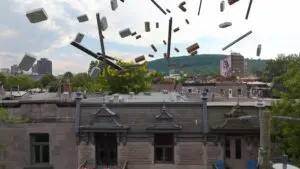“One of the penalties of an ecological education is that one lives alone in a world of wounds.” ~Aldo Leopold, A Sand County Almanac
Leopold was referring to the fact that, while most people see a soothing wall of green, an ecologist sees the spread of invasive knotweed and barberry on the forest floor, choking out the growth of young oak trees that would have provided food for future wildlife.
Ecologists also note the absence of brook trout in a warming stream, the swarm of woolly adelgid killing a hemlock tree, and that the birds are all wrong for this time of year. They are no fun at parties. The effects of climate change are increasing, as evidenced by the droughts and wildfires we are experiencing. Cataloging wounds is a big part of my job. If you bring up the environment, I am not fun at parties.
What is an ecologist to do? Should we keep our mouths shut or, as Leopold writes, “be the doctor who sees the marks of death in a community that believes itself well and does not want to be told otherwise”?
This conundrum was on my mind last weekend while I drove to Vermont with my wife, who scrolled through her phone to update me on the wildfires in New Jersey, Orange County and the Catskills. We weren’t driving north to escape the smoke. If this year has taught us anything, it’s that there is nowhere outside the climate crisis.
Instead, we were on our way to Montpelier for the 2024 Equinox Environmental Film Festival. I am a talking head in a documentary called Against the Current: Music & Activism on the Hudson River that was being shown, and it was disconcerting to see myself on the big screen. (When we got home, the first thing I did was replace the batteries in my nose-hair trimmer.) The film was great, despite my lumbering and hairy presence, but it was two other entries that I am still thinking about a week later.
One was the documentary Feeling the Apocalypse about a therapist who is so anxious about climate change that he starts seeing a therapist. When his therapist asks what’s wrong, he launches into a litany of climate doomerism, depressing her, as well. He goes on vacation with his family and talks about sea-level rise. He is no fun at parties.
Finally, he mainlines so much bad news that he has a breakthrough and realizes he is grieving for the world as we know it. But, inspired by how ordinary people respond to disasters like Covid and Superstorm Sandy, he sees that, instead of being trapped in the old narrative that the world is ending, we can look to new narratives that show us that the world is also beginning.

The film that won the top prize was one of those narratives. Les Matérialistes (below and at lesmaterialistes.webflow.io) is a 12-minute “docu-film” from the future about how humans worked together from 2020 to 2050 to solve the global waste crisis. None of it seemed like science fiction. Instead, it was filled with practical steps such as global treaties to make sure that prices of new materials include the ecological and social impacts of mining them, while reframing demolition projects in cities as “urban mines” in which every scrap of material is cataloged, stored and reused.
As two of the filmmakers explained, they created the film after talking to solid waste experts about what was possible and showed early drafts to governments worldwide for input. Lawmakers in Montreal, where much of the film is set, thought it was too ambitious. Swiss lawmakers thought it wasn’t ambitious enough. But many who saw it told them that it filled a void: a much better world is possible and practical.
Aldo Leopold never lived to see A Sand County Almanac become a classic. He died shortly before it was published while fighting a wildfire on his neighbor’s land. His final act was certainly heroic, but there was also something old-fashioned and neighborly about it. He was protecting the people and the places he loved, but also helping someone else out whom he knew. What do you do when your neighbor’s house is burning? Stay home and panic or do something about it?
The old story is that the world is on fire. The new story is that we can work together to put it out. We do live in a world of wounds, but we do not have to live in it alone.


Thank you for this column. What could be better than being fun at parties? How about a sensitive soul sharing his knowledge of new narratives and offering a sense of community and hope? Many thanks, Brian.